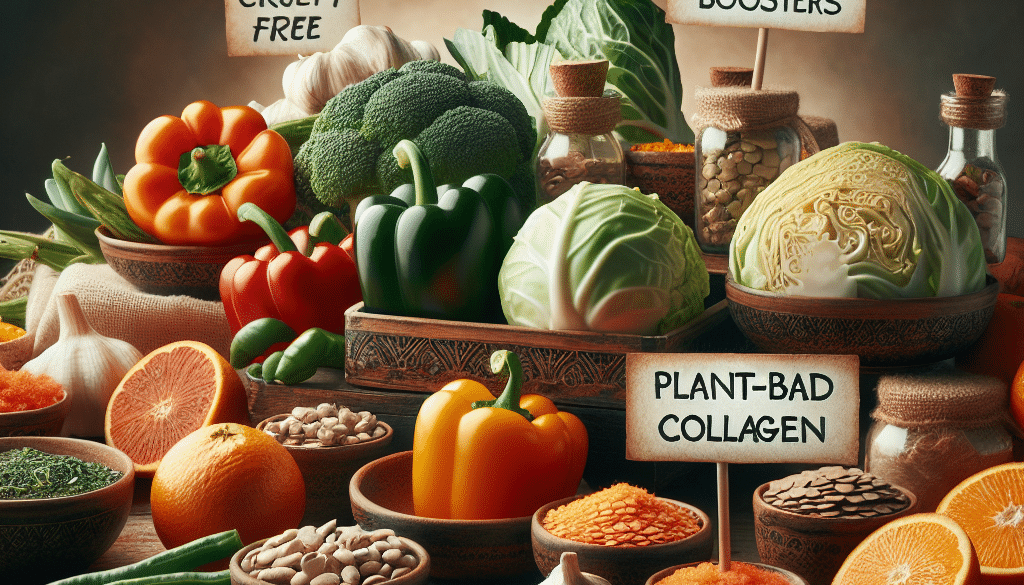Vegan Collagen Sources: Cruelty-Free Beauty Boosters
-
Table of Contents
- Vegan Collagen Sources: Enhancing Beauty the Cruelty-Free Way
- Understanding Collagen and Its Importance
- The Rise of Vegan Collagen
- Top Vegan Collagen Sources
- Benefits of Vegan Collagen for Beauty
- Case Studies and Research
- Consumer Trends and Market Growth
- Conclusion: Embracing Vegan Collagen for Ethical Beauty
- Discover ETChem’s Protein Products
Vegan Collagen Sources: Enhancing Beauty the Cruelty-Free Way

Collagen is a protein that’s crucial for maintaining the health and structure of our skin, hair, nails, bones, and joints. Traditionally, collagen supplements have been derived from animal sources, such as bovine or marine collagen. However, with the rise of veganism and ethical consumerism, there’s a growing demand for plant-based alternatives that offer the same benefits without animal exploitation. In this article, we’ll explore the world of vegan collagen sources and how they serve as cruelty-free beauty boosters.
Understanding Collagen and Its Importance
Collagen is the most abundant protein in the human body, making up about 30% of our total protein content. It’s a key component of connective tissues and is responsible for the elasticity and strength of our skin. As we age, our bodies produce less collagen, leading to signs of aging such as wrinkles and sagging skin. Supplementing with collagen can help to mitigate these effects.
The Rise of Vegan Collagen
Vegan collagen is a new frontier in the beauty and wellness industry. Unlike traditional collagen, which is extracted from animals, vegan collagen is produced through a process of fermentation using genetically modified yeast and bacteria. This process results in a collagen that is structurally similar to animal-derived collagen but is 100% plant-based and cruelty-free.
Top Vegan Collagen Sources
While direct vegan collagen supplements are relatively new, there are several plant-based foods and ingredients that can support the body’s natural collagen production:
- Vitamin C-Rich Foods: Vitamin C is a critical nutrient for collagen synthesis. Foods like oranges, strawberries, bell peppers, and broccoli are excellent sources.
- Proline and Lysine-Rich Foods: These amino acids are building blocks of collagen. Legumes, nuts, and seeds are good sources of lysine, while proline can be found in asparagus, mushrooms, and cabbage.
- Mineral-Rich Foods: Zinc and copper are minerals that play a role in collagen production. Foods like lentils, tofu, cashews, and sesame seeds can provide these nutrients.
- Antioxidant-Rich Foods: Antioxidants protect the skin from damage and support collagen health. Berries, green tea, and dark chocolate are all rich in antioxidants.
Benefits of Vegan Collagen for Beauty
Vegan collagen can offer a range of beauty benefits, including:
- Improved skin elasticity and hydration
- Reduction in the appearance of fine lines and wrinkles
- Stronger nails and hair
- Support for joint health
These benefits make vegan collagen an attractive option for those looking to maintain a youthful appearance and support their overall health without compromising their ethical values.
Case Studies and Research
While research on vegan collagen is still emerging, several studies have shown promising results. For example, a study published in the Journal of Drugs in Dermatology found that a plant-based collagen supplement improved skin elasticity and hydration after 12 weeks of use. Another study in Nutrients reported that a vegan collagen booster increased pro-collagen type I by 65%.
Consumer Trends and Market Growth
The demand for vegan collagen is part of a larger trend towards plant-based and cruelty-free products. According to a report by Grand View Research, the global vegan cosmetics market size was valued at USD 15.1 billion in 2020 and is expected to grow at a compound annual growth rate (CAGR) of 5.0% from 2021 to 2028. This growth is driven by increasing awareness of animal welfare and the environmental impact of animal-derived ingredients.
Conclusion: Embracing Vegan Collagen for Ethical Beauty
Vegan collagen sources offer a sustainable and ethical alternative to traditional animal-derived collagen supplements. By supporting the body’s natural collagen production with plant-based nutrients and embracing innovative biotechnology, consumers can enjoy the beauty benefits of collagen without compromising their values. As research continues to evolve, vegan collagen is set to become a staple in cruelty-free beauty routines.
Discover ETChem’s Protein Products
If you’re looking for high-quality protein products, including vegan options, ETChem is a company worth considering. Their extensive range of collagen products caters to various industries and dietary preferences, ensuring that you can find the right solution for your protein needs.
About ETChem:
ETChem, a reputable Chinese Collagen factory manufacturer and supplier, is renowned for producing, stocking, exporting, and delivering the highest quality collagens. They include marine collagen, fish collagen, bovine collagen, chicken collagen, type I collagen, type II collagen and type III collagen etc. Their offerings, characterized by a neutral taste, instant solubility attributes, cater to a diverse range of industries. They serve nutraceutical, pharmaceutical, cosmeceutical, veterinary, as well as food and beverage finished product distributors, traders, and manufacturers across Europe, USA, Canada, Australia, Thailand, Japan, Korea, Brazil, and Chile, among others.
ETChem specialization includes exporting and delivering tailor-made collagen powder and finished collagen nutritional supplements. Their extensive product range covers sectors like Food and Beverage, Sports Nutrition, Weight Management, Dietary Supplements, Health and Wellness Products, ensuring comprehensive solutions to meet all your protein needs.
As a trusted company by leading global food and beverage brands and Fortune 500 companies, ETChem reinforces China’s reputation in the global arena. For more information or to sample their products, please contact them and email karen(at)et-chem.com today.

